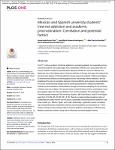| dc.contributor.author | Aznar-Diaz, Inmaculada | |
| dc.contributor.author | Romero-Rodríguez, José-María | |
| dc.contributor.author | García-González, Abel | |
| dc.contributor.author | Ramírez-Montoya, María-Soledad | |
| dc.creator | https://orcid.org/0000-0002-9284-8919 | |
| dc.date.accessioned | 2020-05-25T22:24:01Z | |
| dc.date.available | 2020-05-25T22:24:01Z | |
| dc.date.issued | 2020-05-24 | |
| dc.identifier.doi | https://doi.org/10.1371/journal.pone.0233655 | |
| dc.identifier.uri | https://hdl.handle.net/11285/636364 | |
| dc.description.abstract | The 21st-century problem of Internet addiction is increasing globally, but especially among university students. Not surprisingly, then, problematic Internet use is associated with university students’ academic procrastination. Because studies are scarce in Mexico and Spain has one of the highest rates of Internet addiction in Europe, this paper (i) analyzed the presence and degree of Internet addiction among university students in Mexico and Spain, (ii) determined potential sociodemographic factors influencing Internet addiction, and (iii) established the type of correlation between Internet addiction and academic procrastination. The cross-sectional study design used an online questionnaire to measure problematic Internet use and academic procrastination through convenience sampling at one university in Mexico and one in Spain. The questionnaire contained three sections: participants’ sociodemographic data, the Internet Addiction Test, and the Academic Procrastination Scale. The final sample comprised 758 university students, 387 from Mexico, and 371 from Spain, aged from 18 to 35 (M = 20.08, SD = 3.16). Results revealed similar prevalence rates of problematic and daily Internet use for leisure, potentially influencing Internet addiction in all three models (i.e., Mexico, Spain, and Total). Additionally, significant positive correlation was revealed between problematic Internet use and academic procrastination (p < .001). Finally, findings showed relevant data on Internet addiction’s prevalence in Mexican and Spanish university contexts, along with its influential sociodemographic factors. | es_MX |
| dc.language.iso | eng | es_MX |
| dc.relation.isFormatOf | versión publicada | es_MX |
| dc.rights | openAccess | es_MX |
| dc.rights.uri | http://creativecommons.org/licenses/by/4.0/ | * |
| dc.subject | HUMANIDADES Y CIENCIAS DE LA CONDUCTA::PEDAGOGÍA::TEORÍA Y MÉTODOS EDUCATIVOS::MÉTODOS PEDAGÓGICOS | es_MX |
| dc.subject.lcsh | Education | es_MX |
| dc.title | Mexican and Spanish university students’ Internet addiction and academic procrastination: Correlation and potential factors | es_MX |
| dc.type | Artículo/Article | es_MX |
| dc.identifier.journal | PLoS ONE | es_MX |
| dc.subject.keyword | Internet addiction | es_MX |
| dc.subject.keyword | academic procrastination | es_MX |
| dc.identifier.volume | 15 | es_MX |
| dc.identifier.issue | 5 | es_MX |
| dc.identifier.startpage | e0233655. | es_MX |
| dc.contributor.affiliation | Department of Didactics and School Organization, University of Granada. | es_MX |
| dc.subject.country | Italia / Italy | es_MX |
| dc.identificator | 4||58||5801||580107 | es_MX |

